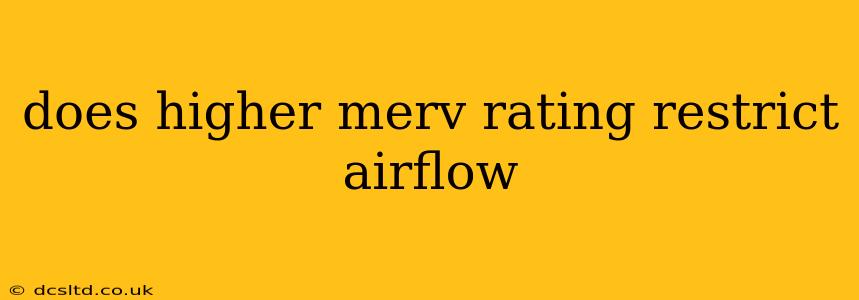Does a Higher MERV Rating Restrict Airflow?
Yes, a higher MERV rating can restrict airflow, but it's not a simple yes or no answer. The relationship between MERV rating and airflow is complex and depends on several factors. Understanding this relationship is crucial for homeowners and HVAC professionals to choose the right filter for their system.
Understanding MERV Ratings:
MERV stands for Minimum Efficiency Reporting Value. It's a standardized rating system that measures a filter's ability to remove airborne particles of varying sizes. A higher MERV rating (e.g., MERV 13-16) indicates a greater ability to capture smaller particles, including dust mites, pollen, mold spores, and even some viruses and bacteria. Lower MERV ratings (e.g., MERV 4-8) are better at removing larger particles like dust and lint.
The Trade-off: Filtration Efficiency vs. Airflow Restriction
The key thing to remember is that improved filtration efficiency (higher MERV rating) often comes at the cost of increased airflow restriction. A filter with a higher MERV rating has a denser media, which traps more particles but also creates more resistance to airflow. This means your HVAC system has to work harder to push air through the filter.
How Much Does a Higher MERV Rating Restrict Airflow?
The degree of airflow restriction depends on several factors:
-
The MERV rating itself: Higher MERV ratings generally lead to more airflow restriction. The difference between a MERV 8 and a MERV 11 might be relatively minor, but the jump from MERV 11 to MERV 16 can be significant.
-
The filter's design and construction: Different manufacturers use different materials and designs, which can impact airflow resistance. Even two filters with the same MERV rating may perform differently in terms of airflow restriction.
-
The HVAC system's capacity: A more powerful HVAC system can handle higher airflow resistance more easily than a weaker one. An older or less efficient system might struggle with a high-MERV filter.
-
The filter's size and surface area: A larger filter with a greater surface area will generally restrict airflow less than a smaller filter with the same MERV rating.
-
The cleanliness of the filter: A clogged filter, regardless of its MERV rating, will significantly restrict airflow. Regular filter changes are essential, even with high-MERV filters.
What Happens When Airflow is Restricted?
Excessive airflow restriction can lead to several problems:
-
Reduced heating and cooling efficiency: The HVAC system has to work harder, consuming more energy and potentially leading to higher utility bills.
-
Increased wear and tear on the HVAC system: The added strain can shorten the lifespan of your system's components.
-
Inadequate airflow: Insufficient airflow can lead to uneven temperatures throughout your home and reduced comfort.
-
Increased static pressure: This can place stress on the blower motor and other components.
Should You Use a High-MERV Filter?
The ideal MERV rating depends on your specific needs and your HVAC system's capabilities. While higher MERV ratings offer superior filtration, they might not be suitable for all systems. Consult with an HVAC professional to determine the highest MERV rating your system can handle without compromising airflow or causing damage. They can assess your system's capacity and recommend the appropriate filter for your home's air quality needs.
How Often Should I Change a High-MERV Filter?
High-MERV filters tend to clog faster than lower-MERV filters due to their increased filtration capacity. Therefore, it’s crucial to change them more frequently. Check the filter’s manufacturer recommendations and visually inspect it regularly. If it looks noticeably dirty or clogged, it’s time for a change, regardless of the timeframe. Replacing it promptly is vital to maintain proper airflow and avoid putting strain on your HVAC system.
What are the alternatives to high-MERV filters to improve air quality?
While high-MERV filters are effective, consider alternative strategies for optimal air quality, such as:
- Regular HVAC maintenance: Professional maintenance ensures efficient operation and optimal airflow.
- Air purifiers: These can supplement your HVAC system's filtration capabilities.
- Addressing indoor moisture issues: High humidity can worsen air quality, prompting the growth of mold and mildew.
By carefully considering the interplay between MERV rating, airflow, and your HVAC system's capacity, you can optimize your home's air quality and ensure the longevity and efficiency of your heating and cooling equipment. Remember to consult with a qualified HVAC professional for personalized advice.
